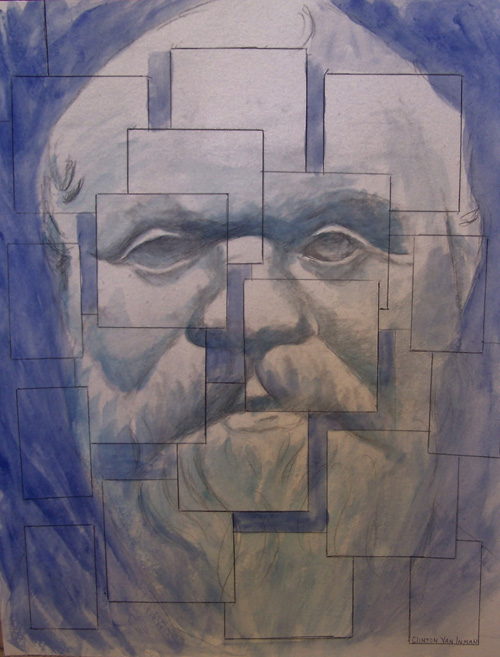
Your complimentary articles
You’ve read one of your four complimentary articles for this month.
You can read four articles free per month. To have complete access to the thousands of philosophy articles on this site, please
Ancient Greek Wisdom
What Philosophy Does To Philosophers
Rohan Somji looks at the consequences of thinking for three antique thinkers.
A philosopher is someone who sees deep questions where others find things straightforward. This I call ‘problematising’, or, as Plato called it, ‘the search for essence’. In any case, it instills a sense of mystery, awe and wonder. Now, there are numerous ways of problematising and dealing with it; but rest assured, the consequences it has on the problematiser are definite and enduring.

Socrates Examined © Clint Inman 2020. Facebook him at clinton.inman
Where better to look for examples of the impact of philosophy on life than three fathers of Greek thought: Socrates, Diogenes, and Pyrrho? They had widely different, highly eccentric personalities (the price of authenticity, perhaps?). Although they differed in their philosophical approaches, they are all excellent examples of the impact philosophy has, for better or worse.
The last words of Socrates (470-399 BC) were “Crito, we owe a rooster to Asclepius. Please, don’t forget to pay the debt.” Ironic, given that Asclepius was the god of medicine and Socrates had just drunk hemlock. Was he implying that the poison was the cure for life? Or was he just displaying humour and insouciance, even at the brink of death?
Socratic enquiry consisted of the disciplined questioning of things taken for granted by others. But it’s interesting that though the task is to dissect a complex idea, none of Plato’s dialogues actually end with Socrates satisfied that he has reached the heart of the concept. Socrates displays great patience, and is noteworthy for his ability to recognise and point out ignorance. How ironic that the first great philosopher in the West was also the first to claim true ignorance. The humility and the passion to know that proceeds from such a state is evident.
It is said that Diogenes (412-323 BC) was once seen rolling a barrel up and down a hill from sunrise to sunset. When asked why, he said that when the citizens heard that invaders were marching towards them the city began to hustle and bustle. Diogenes concluded, “I wanted to look as busy as they.” This kind of mockery was typical of Diogenes the Cynic.
Nietzsche once remarked, “Make your life a work of art”, and maybe his words travelled back through time, because that’s precisely what Diogenes did. He was an ascetic, living a life of virtue over pleasure. He claimed he was “a citizen of the world rather than a place,” so was the first recorded cosmopolitan. He challenged every moral, custom, and regular way of life without regard to the consequences. This challenging came from his acute sense of seeing problems in Greek society.
Although very apocryphal and there being little more than a few anecdotes about him preserved, Diogenes nevertheless was a master problematiser. He could see that the way of life of people in the cities had strayed far away from virtue, maintaining only a façade of behaving appropriately, without any concern for cultivating virtue within. In the case of slavery (an integral part of Greek society), once Alexander the Great found the philosopher looking attentively at a pile of human bones. Diogenes explained, “I am searching for the bones of your father, but cannot distinguish them from those of a slave.”
Pyrrho of Elis (c.360-c.270 BC) accompanied Alexander the Great in his invasion of India. There, he encountered the gymnosophists – naked wise men. This exposure seems to have inspired him to live a life of solitary inquiry.
Considered the father of Skeptical philosophy, Pyrrho lived a radically skeptical life. He doubted pretty much everything, essentially problematising the very possibility of knowledge, as well as the possibility of any stable unchanging nature that could be studied or known. His approach was based on epoche, a suspension of judgement. The effect of this thinking was, first, inducing a stunned silence or non-assertion known as aphasia, subsequently leading to ataraxia, or freedom from worry. For Pyrrho, the way to a happy life was by ridding oneself of the suffering caused by worry. This meant recognising the illusory nature of knowledge itself and coming to terms with the inaccessibility of any knowledge at all. Someone needs to go through a deep shift to allow such a state to be realised in terms of lifestyle.
The lives of these three philosophers show that philosophy can be far from just theoretical speculation. The father of moral philosophy, the father of Cynicism, and the father of Skepticism, each lived a philosophical life as well as initiating a discourse. Their lives embodied the truths that they proclaimed. For each, philosophy was a practice more than a teaching – or rather, their way of life was the teaching. Interestingly, none of the three philosophers I’ve discussed wrote any major works themselves. We know of them mostly through the writings of their pupils.
In an age of information and an abundance of the tools of pleasure, it is time we learnt again from those who knew how little they knew. Problematising may be the antidote to our vanity, inculcating humility and curiosity. It prevents us from being satisfied with spoon-fed oversimplified ideas about our world. It makes us seek restlessly for clearer, deeper answers about reality and about ourselves. Seeking begins only when there is something to be sought.
Above all, philosophy is about enhancing awareness, which is perhaps the key trait defining humanity. If philosophy has had one influence on peoples’ lives, this is the only influence it needs. To be aware is to be human.
© Rohan Somji 2020
Rohan Somji is a postgraduate from the University of Mumbai, currently working towards applying Continental philosophy’s insights to developments in AI.









